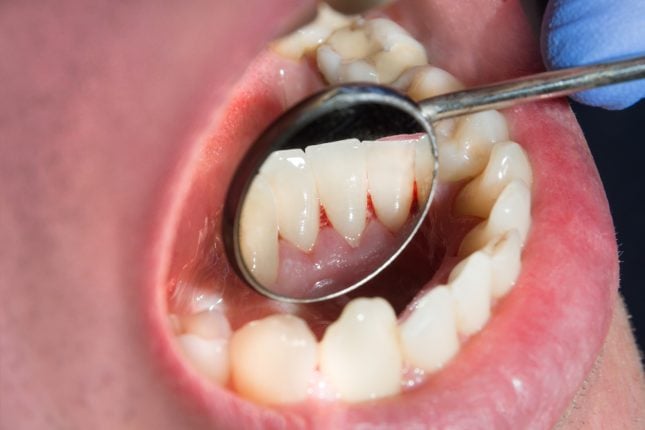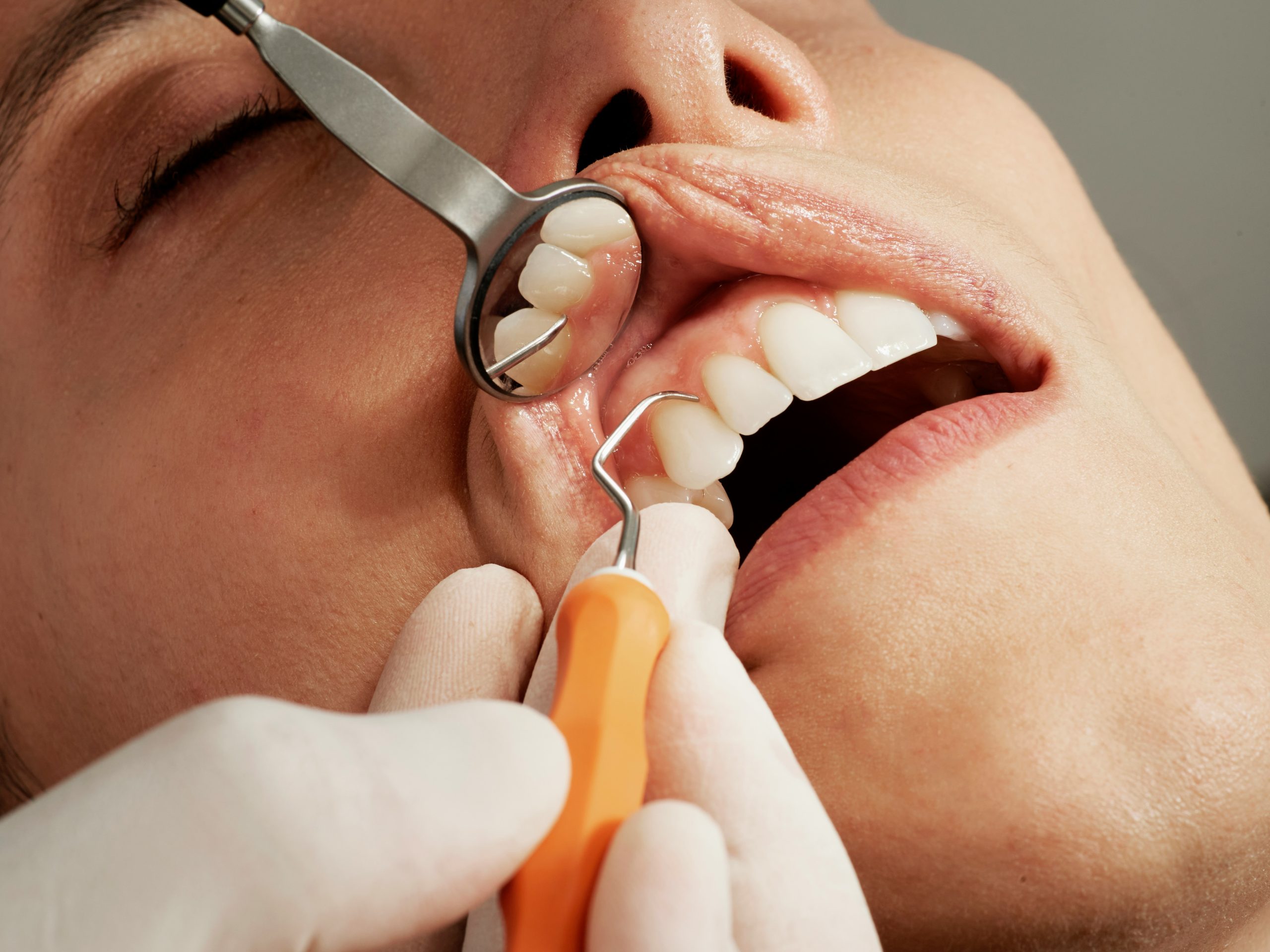What Is Gingivitis? Understanding the Early Stage of Gum Disease
Gingivitis is a common and mild form of gum disease—also known as periodontal disease—that causes irritation, redness, and swelling (inflammation) of your gingiva, the part of your gum around the base of your teeth. It’s typically caused by a buildup of plaque, a soft, sticky film made up mostly of bacteria.
When left untreated, gingivitis can progress to periodontitis—a more serious gum infection that damages the soft tissue and bone supporting the teeth. Fortunately, gingivitis is reversible with good oral hygiene and professional care.
Stages of Gum Disease: From Gingivitis to Periodontitis
There are several stages of gum disease:
- Gingivitis – Characterized by bleeding gums, redness, and irritation. Reversible.
- Early Periodontitis – Gums begin to recede, and slight bone loss may occur.
- Moderate Periodontitis – Increased pocket depth around teeth, loose teeth possible.
- Advanced Periodontitis – Severe bone loss, tooth mobility, and potential tooth loss.
Spotting gingivitis early gives you the best chance of preventing progression.

Gingivitis Dental Effect Example
Causes of Gingivitis: What Triggers Gum Inflammation?
Several factors can lead to gingivitis, including:
- Poor oral hygiene – Inconsistent brushing and flossing leads to plaque and tartar buildup.
- Dental plaque and bacteria – Plaque harbors bacteria that irritate gum tissue.
- Tobacco use – Smoking reduces the ability of gum tissue to heal.
- Hormonal changes – Pregnancy, menstruation, and menopause can increase gum sensitivity.
- Medical conditions – Diabetes, HIV/AIDS, and cancer treatments can affect gum health.
- Dry mouth – Saliva helps wash away food and neutralize bacteria.
- Medications – Some drugs can reduce saliva or cause gum overgrowth.

Pregnancy can increase your risk of gingivitis due to hormonal changes. If you notice gum discomfort or bleeding, see a dental professional early to prevent complications.
Symptoms of Gingivitis You Shouldn’t Ignore
Even in its early stages, gingivitis can show noticeable signs. Common symptoms of gingivitis include:
- Bleeding gums when brushing or flossing
- Swollen or puffy gums
- Tender gums
- Receding gum line
- Persistent bad breath (halitosis)
- Bright red or dusky red gums
If you experience any of these, it’s time to see a dentist.
How Gingivitis Is Diagnosed by a Dental Professional
A dentist may diagnose gingivitis through:
- Visual examination – Looking for redness, swelling, and bleeding.
- Probing – Measuring gum pocket depth with a dental probe.
- Dental X-rays – Checking for bone loss or tartar under the gums.
Early diagnosis is key in reversing this form of gum disease.
Complications of Gingivitis If Left Untreated
Without treatment, gingivitis can progress to periodontitis, a chronic condition that may result in:
- Gum recession and deep pockets
- Bone loss around teeth
- Loose teeth or tooth loss
- Systemic inflammation affecting overall health
Regular dental checkups help prevent these complications.
Preventing Gingivitis: Best Practices for Oral Health
You can prevent gingivitis by:
Consistency is the most important factor in preventing gum disease.

Professional dental cleanings help remove plaque and tartar that daily brushing can’t reach. Regular visits are key to preventing and reversing gingivitis.
Exploring Other Forms of Gingivitis
While most cases of gingivitis are caused by plaque buildup, other less common forms exist. Necrotizing ulcerative gingivitis (NUG) is a severe form that involves tissue death and is often accompanied by intense pain, bad breath, and even fever. This condition requires urgent care and may be linked to compromised immunity or extreme stress.
Chronic gingivitis is another form that may persist for years, especially when proper dental care is inconsistent. It may appear stable but can slowly inflame gum tissue, increasing long-term risk of progression to periodontitis.
Understanding the Inflammatory Response in Gum Disease
The body’s inflammatory response to bacteria in plaque is what causes gum tissues to swell, redden, and bleed. This natural defense mechanism is helpful at first—but if plaque isn’t removed, chronic inflammation develops. That’s when healthy tissue begins to break down.
Research has shown that untreated gingivitis triggers a cascade of immune reactions. Over time, this low-grade inflammation can also affect your body beyond the mouth—especially in people with type 2 diabetes or heart conditions.
The Smile Bar Bangkok: Your Partner in Gum Health
We offer a tailored approach to gum care:
- Non-invasive, professional cleanings
- Soothing studio setting near Siam BTS
- Personalized guidance on home routines
- Prompt referrals for advanced periodontal care if needed
Whether you’re an expat, tourist, or Bangkok local, our expert team helps you feel confident about your teeth and gums.

At The Smile Bar Bangkok, professional cleanings and gentle care in a relaxing studio help keep your gums healthy and your smile bright.
Final Thoughts: Stop Gingivitis Before It Gets Serious
Gingivitis may be common, but it’s not harmless. By recognizing the early signs, adopting better oral hygiene habits, and seeing a dentist regularly, you can maintain healthy gums and avoid long-term complications.
At The Smile Bar in Bangkok, we’re here to help you every step of the way—with expert care, a welcoming atmosphere, and a genuine focus on prevention.
Plan Your Visit to The Smile Bar Bangkok
Conveniently located in Siam Square Soi 5 near BTS Siam, The Smile Bar offers high-quality dental cleanings in a uniquely relaxing space.
Book your session today and protect your smile from gum disease—before it starts.
Frequently Asked Questions
Can I treat gingivitis on my own?
- You can manage early gingivitis with thorough brushing, flossing, and a gentle mouthwash, but once tartar forms, professional cleaning is essential. DIY efforts help, but shouldn’t replace a dentist’s or hygienist’s care.
Is gingivitis reversible?
- Yes, gingivitis is reversible in its early stages with proper hygiene and timely dental cleanings. Once it progresses to periodontitis, the damage becomes harder to undo.
Does gingivitis go away on its own?
- Gingivitis won’t go away without intervention. Left untreated, it may progress even if symptoms seem mild. Regular cleanings and improved daily care are necessary to restore gum health.
Should you brush gingivitis?
- Absolutely. Gentle brushing with a soft-bristled toothbrush is vital. It removes plaque that causes inflammation, but avoid scrubbing too hard to prevent further irritation.
Does gingivitis cause gum recession?
- Yes, ongoing inflammation can gradually lead to gum recession. This exposes tooth roots and increases sensitivity, making early treatment crucial.
Can gingivitis cause swollen lymph nodes?
- While not common, severe or advanced gum infections may contribute to localized swelling, including in nearby lymph nodes. It’s a sign to seek professional evaluation.
How long should gingivitis last?
- With proper care, early-stage gingivitis often improves within 10 to 14 days. Persistent symptoms beyond this may indicate deeper issues requiring professional help.
Is gingivitis contagious?
- Gingivitis itself isn’t contagious, but the bacteria behind it can be shared through saliva. Maintaining personal oral hygiene is key, especially in close relationships.
What’s the best mouthwash for gingivitis?
- Look for an alcohol-free, antibacterial formula containing chlorhexidine or essential oils. Your dental professional can recommend a brand suited to your needs.
Can gingivitis return after treatment?
- Yes. If good oral hygiene and regular checkups are not maintained, gingivitis can reoccur. Consistency is key to keeping it at bay for the long term.










